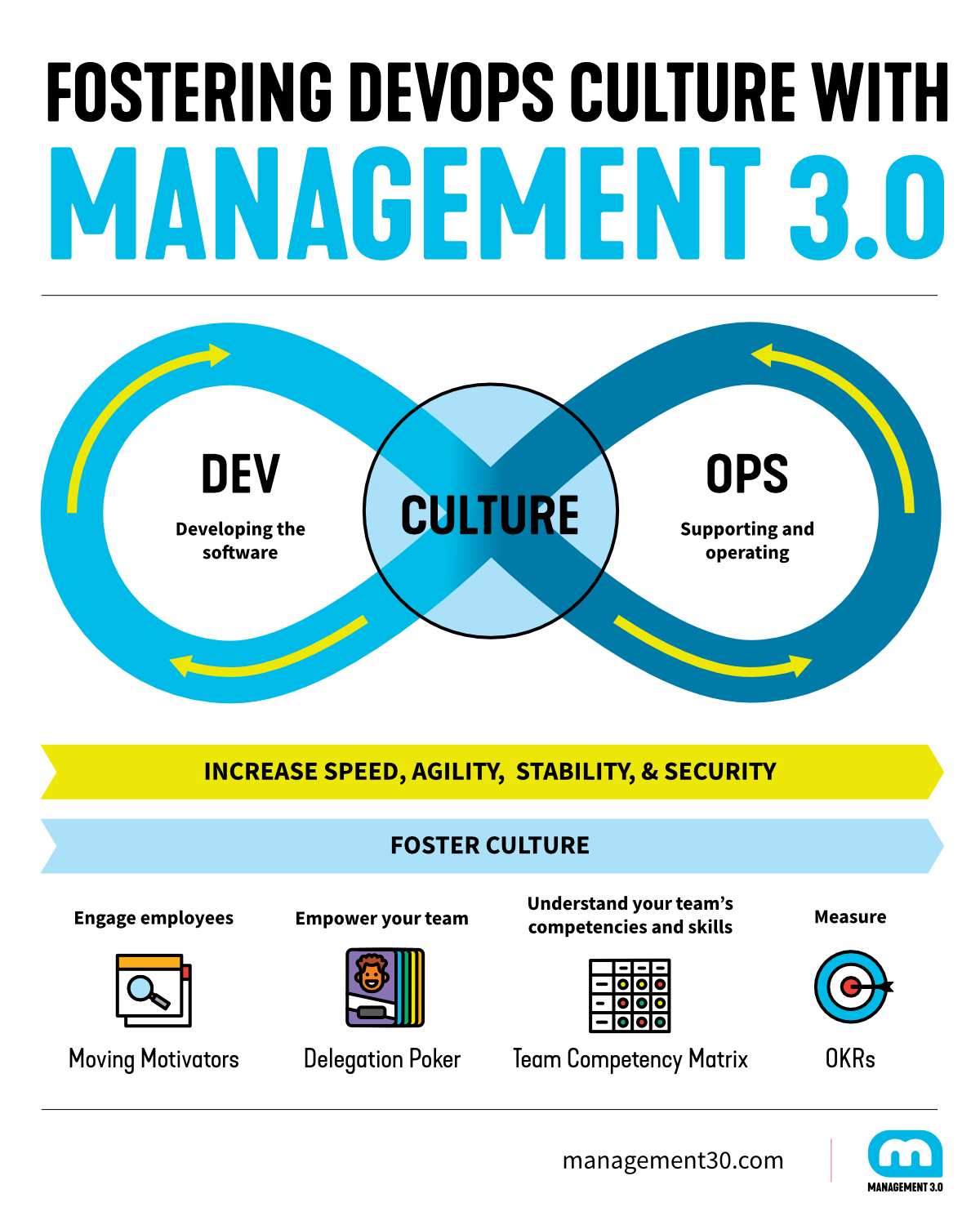On a DevOps cycle, doing experiments is something natural. Many companies want to adopt the DevOps tooling but are not changing their culture or mindset. And what is the consequence of this? Burnout and turnover! But this doesn’t have to be the case: Management 3.0 Facilitator and Lead Architect Wania Konageski reveals how to build a thriving DevOps culture.
In recent years, there has been an urgency for companies to adopt agile delivery methods in various sectors. For that reason, many companies have changed their organizational structures and moved away from traditional models, creating better environments to stimulate the adoption of agile frameworks, mainly with their products and projects. The justification in most cases is to develop small deliveries through which the customer can see both the product being delivered, and the possibility to change the direction of creation, while being more responsive to changes.
Being more agile and efficient and responding faster to change happens not only in the product life cycle, but also in how you work on the technical side.
Considering development and operations teams, for example, there are strategies to implement DevOps to break the silos and help to deliver better applications. However, the disappointments associated with the DevOps concept start at this point. Can you relate?
Let’s start with a definition associated with “DevOps”.
What is DevOps?
DevOps combines Development and Operations; it is a set of practices and a cultural change. Its primary objective is to eliminate the main barriers between development and operations teams to improve collaboration and communication.
Traditional operations have two different areas, one responsible for developing the software, and the other for supporting and operating. With this conventional split, the communication between the teams was low. In addition, this traditional model was not dynamic, and because of the evolution of technologies (mainly because of Cloud adoption), the DevOps concept has become vital in companies’ strategies.
For example, if your company has an application, the velocity needed to provide a solution for a technical issue requires more agile and multidisciplinary teams. Imagine that you have an e-commerce business, and your mobile app is not working one day before Black Friday. As a customer of the application provider, you need the technology team to solve the issue fast as you want the application to work without bugs. So, Dev and Ops teams work together to help find the fastest solution.
In the past, the release of an application happened based on months of planning. Today however, applications are updated and changed almost every week, hence speed matters!
If a company does not adopt or consider incorporating elements from the DevOps approach, it cannot survive the following years.

What benefits could DevOps help you achieve?
The four most popular benefits associated with DevOps are:
- Speed
- Agility
- Stability
- Security.
By eliminating the division between development and operations teams, the expected result is an improvement in a company’s ability to move quickly and act on new demands. However, when we talk about teams, people will be at the center of the transformation. Without considering the people as a critical factor in a DevOps implementation strategy, the probability of failing is high.
Through 2023, 90% of DevOps initiatives will fail to fully meet expectations due to the limitations of leadership approaches, not technical reasons.
Gartner
But why does this happen? Why is it so difficult to change and be DevOps?
In the past, the culture associated with operational areas was restricted, commonly associated with using heavy processes to document every step and action executed by an employee.
This resulted in engineers putting pressure on themselves to avoid mistakes. And, in many cases, created rigid mindsets in which employees thought:
“I’ve been doing this for over ten years; why should I change?”
“It is working. Don’t touch anything.”
This culture, in which making a mistake is not seen positively, indirectly creates limitations to being innovative. If you want to improve, you probably will fail, and after that, you will find a suitable solution. In the opposite scenario, we have the DevOps culture, in which you need space to experiment with new things to find the best result.
DevOps Leadership Importance
Based on the items above, imagine that a manager within a traditional culture is responsible for implementing DevOps in a company. Do you believe that will be successful? It depends.
Again, we are talking about human behavior.
If you, as a leader, want to be ready for the new challenges that digital transformation is creating for all of us, you will endeavor to change your mindset and discover new ways to work with your team. Welcome to the Management 3.0 mindset.
It is always important to remember that the implementation of agility does not only mean the use of new tools, but a relationship between frameworks and mindset: DevOps follows the same principle.
Doing Scrum does not mean your company is being Agile; there is a difference between Doing and Being. Likewise, a company that bought new tools to support Continuous Integration and Continuous Delivery (CI/CD) does not mean that they implemented the DevOps culture with success.
What will happen if you do not consider the people in your DevOps journey?
The probability of failing is high if your company culture does not incorporate the DevOps culture, no matter how many tools you buy.
DevOps workers are particularly at risk of burnout because they are often expected to perform multiple tasks and roles, be highly responsive to client needs, and constantly have to keep up with new technologies. If they are not happy and motivated, they will leave the company, impacting the turnover of your business.
Management 3.0 has tools that can help you both transform your culture and make vital changes. See below for some points and tips to help you in the DevOps journey.
Also read: How to get your Agile Transformation Right
Build DevOps Culture through Engaging Employees
DevOps Culture requires transparency and good communication, therefore engaging your employees is essential. Understanding your team’s motivation and mapping the points to be improved is important. You could set up a meeting to play Moving Motivators with your DevOps team.
In a transition phase where you will combine the teams, it is essential to understand what elements motivate each team member and the moment they are in now.
I played Moving Motivators with EMEA and Latam team members, which was eye-opening. I felt the different motivations in our teams and realized that, as a team lead, I must provide space and tools to live their motivations to keep them in the team and company instead of walking away.
Foster DevOps Culture through Empowering your Team
Empower your team to reap good results; play Delegation Poker with your team!
Delegation Poker is a tool that helps us to foster transparent dialogue and clarifies who is responsible for what and at what level. It is a method through which you can encourage employee engagement through controlled self-organization and decision-making.

Transform Devops Culture through Understanding your Team’s Competencies and Skills
Starting the DevOps journey requires knowing how your team is technically prepared to perform the tasks. For example:
Do you have people who know automation at an advanced level on your team to implement everything that is needed?
If you need to know the answer, go to the drawing board and create a Team Competency Matrix.
Use this tool to understand who is an expert and who needs to be trained in your team. Seeing the gaps and sharing the result with all members allows for providing explicit action points to improve your team.
The matrix can be composed of different elements; you do not need to be limited to technical details.
Develop DevOps Culture through Measuring
Evaluating the team’s performance is essential for determining what is working and what needs improvement. In addition to the traditional operational KPIs (Key Performance Indicators), bringing OKRs (Objectives and Key Results) can provide greater clarity for those involved, for example, in the purpose of the changes and in harvesting results more quickly.
Data must be presented to all team members. Only in this way can the team understand how to improve the results. The entire team must be focused on the same goal in digital transformations.

In considering these points presented, I hope your DevOps journey will be incredible! As a leader, you can help create a fantastic culture in your company so that rewarding results will happen. Believe in your team! If you want to learn how to use each tool described, check the following workshops that will occur in your country.
Header photo by Christina Morillo via Pexels

